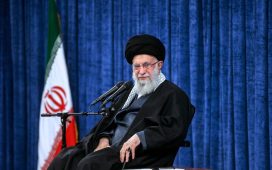An international tribunal has found Iraq’s central bank was to blame for a contractual dispute with an engineering firm that led to the jailing of Australian engineer Robert Pether, prompting his family to make a renewed plea that he be freed from the Baghdad prison cell where he has spent two years.
Pether and his colleague Khalid Radwan were arrested and jailed in 2021 over a contractual dispute between their employer, Cardno ME (CME), and the Central Bank of Iraq, which had hired the firm to help build its new Baghdad headquarters.
The relationship soured in 2020 after the bank attempted to change the contract and failed to pay seven months of invoices to CME. CME withdrew its staff, but in April 2021, Pether and Radwan were invited back to Baghdad to try to resolve the dispute.
They were arrested during a meeting with bank officials and sentenced to five years’ imprisonment on allegations they defrauded the bank. The pair were also fined US$12m.
A recently published decision reveals the contractual dispute at the heart of their arrest was taken to the International Chamber of Commerce (ICC)’s International Court of Arbitration, which ruled in February in favour of CME. The decision found the bank was in breach of its contract with CME and ordered that it pay the engineering firm US$13m, which covers the outstanding invoices, compensation, legal costs, and the release of a performance bond provided by CME.
The decision has only just been made public.
Desree Pether, Robert’s wife, said the decision strengthened the case for releasing the pair.
“However, it has been news to the Central Bank obviously since February and still Robert and Khaled are unlawfully imprisoned and the Central Bank have advised they are pushing forward with the US$50m civil case against [them],” she said.
“So even with a ruling in an international tribunal in favour of CME, the malicious prosecution against two innocent employees continues.”
The United Nations working group on arbitrary detention, in a report released last year, found Pether’s trial was deeply compromised. The report also found the men’s detention was arbitrary, a breach of international law, and demanded their immediate release.
after newsletter promotion
The report said it had received allegations that “[Pether] was exposed to extreme cold, threats of death, humiliation and various forms of psychological abuse.”
According to the complaint, “Pether was detained in a [two-by-two-metre] cell with the lights permanently on”.
“He was reportedly blindfolded, interrogated, screamed at, threatened, insulted and shown torture rooms.”
Guardian Australia revealed in April that internal emails also undermined key evidence relied upon to jail Pether. Pether has also alleged that a “confession” statement used against him was mistranslated by a biased employee of Iraq’s central bank before being handed to court.












